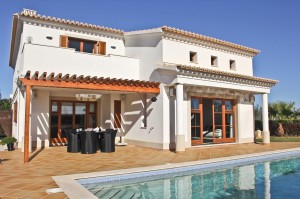Euro QE will boost Algarve property market
ECB announces €1 tn. in quantitative easing
Euro zone policy makers dance to German tune
Cheaper euro will also help Algarve property sales to Brits
All indicators now solidly behind a market recovery
The ECB has finally embarked upon quantitative easing that, had it been applied at the onset of the euro crisis in 2011, would have gone a long way to avoiding the subsequent Portuguese credit squeeze and property bust.
Instead, three years of austerity plunged Southern Europe into deflation while German exports continued to benefit from a reasonably priced euro. Germany could well afford to sit tight while its growing sales to China more than compensated for shrinking sales in Europe.
Only now that China has gone off the boil, and the dog of deflation is snapping at Teutonic heels, has it become politically acceptable to boost the euro zone with the same type of stimulus that was initiated in 2008 to rescue the US and UK economies.
The immediate effect of ECB QE is likely to be euro devaluation, fuelling exports from the single currency zone, rather than directly improving liquidity and bank lending.
It is already happening. The pound, valued at 1.5 euros at the beginning of 2007, fell with the help of QE to a low of 1.04 at the beginning of 2009. It was still only 1.13 at the end of 2011. Now, with euro QE a fact, the pound is back up to 1.33 euros, a level last seen at the beginning of 2008 on the way down.
It was then that rising prices collided with the falling pound to make Algarve property look too expensive to Brits, the region’s most prolific buyers. Prices came off their highs and the market continued to limp along until the euro crisis exposed the fault lines in the single currency project. Mortgage finance dried up, confidence drained away, and the smart money was on the euro zone breaking up.
It seemed that the only logical alternative to collapse would be federalisation, with fiscal policy convergence, liability-sharing through eurobonds and the like. The ECB got a new boss, who promised to do whatever it would take to keep the euro zone together, but German fiscal conservatives were quick to quash any moves that might mean German taxpayers’ having to pick up the bill for Club Med fecklessness. Instead, those economies, suckered into a spending spree by the low interest rates that came with euro membership, would have to pay for their folly through austerity.
In return for bail-out cash, Club Med had to submit to the “troika” recipe. Some ingredients – freeing up the labour market, dismantling quangos, improving tax collection – were palatable; others far less so, Tax increases and budget cuts aimed at reducing deficits actually had the opposite effect, throwing people out of work, depressing output and causing deficits to balloon as a percentage of GDP.
In a currency union of equal partners, such pain and sacrifice must surely be mitigated by measures to stimulate growth and/or reduce debt. With austerity alone failing to deliver, the rest of the world wondered when the euro zone might ever take the tonic to cure its ills.
Now we know the answer: when it was right for the German economy. And it becomes clear that the euro zone is not a union of equal partners but a zone dominated by the needs of its largest member.
For this to change, large chunks of the non-German euro zone must form a coherent bloc to challenge German dominance. France, Italy and Spain together could act as an effective counterweight. A proper democratic election to vote in the leader of the European Commission would also be a positive step. Otherwise the euro zone will remain the federation of greater Germany, a federation in which only the Germans get to vote in the leader.
Back to parochial concerns. With the euro falling against the pound, conditions are finally right for an Algarve property recovery.
The UK economy is growing, UK property prices are back above pre-crisis levels and British buyers, never less than half of all foreign buyers of Algarve property, have a spring in their step. Meanwhile Algarve prices are still scraping along the bottom, at a third or more below their peak.
Add in the demographic growth in retiree numbers, the tax breaks now on offer for taking up residency in Portugal, and the Golden visas available to non-EU property investors, and it is no surprise that the December 2014 RICS/CI Portuguese Housing Market Survey is the most bullish to date.
New buyer enquiries have now been on the increase for seventeen successive months, transactions volumes have been growing for twelve, and confidence is at its highest since the survey began in Q3/2010. After years of falls, prices are now considered stable, with a modest rise predicted over the next three months. Banks are lending again.
The provisional Knight Frank Global Price Index for Q3/2014 reported a modest year-on-year rise of 1.5%, with a fall in the first six months more than balanced by a 3.6% rise in the last six months.
John Tranmer
Feb 2015




